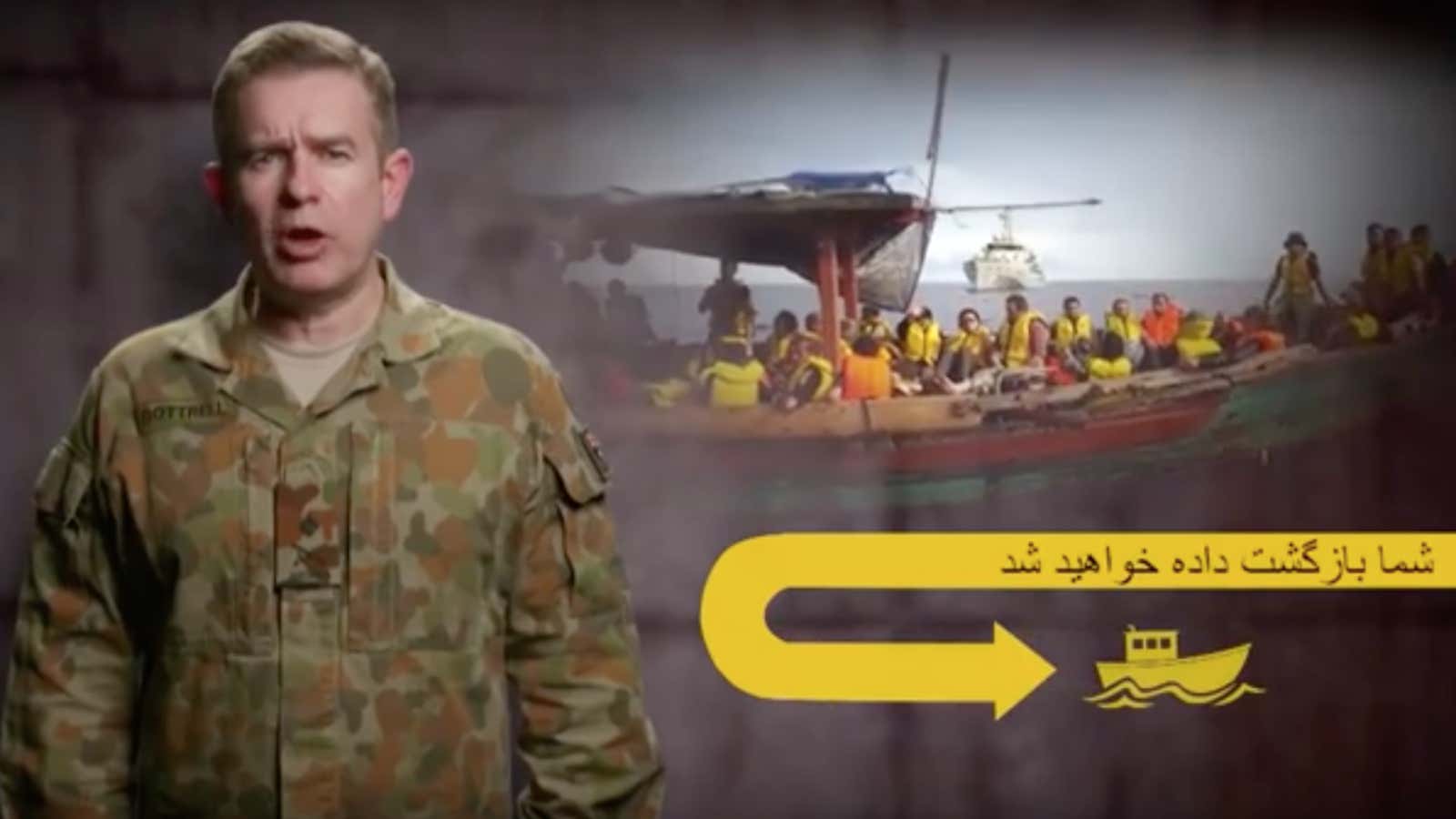When he’s missing home, 17-year-old refugee Farid Rasuli will often go on YouTube and search for folk music in Dari, the Persian dialect of his native Afghanistan. Occasionally, before he can watch the video he wants, he has to sit through a pre-roll advertisement from the Australian Border Force.
Delivered by a stern-faced, camouflage-clad major general, the video advertisement is algorithmically targeted at speakers of certain languages—in this case, Dari—who are located in a transit country such as Indonesia, where Rasuli is awaiting resettlement. These people are part of the thousands of refugees who could be considering paying a smuggler to take them the final odd 3,000 kilometers (1,800 miles) of their journey across the Indian Ocean to Australia, where they want to seek asylum. “Don’t waste your money or risk your life,” the general warns while images of Australian troops intercepting migrant boats roll in the background. “You will be intercepted and turned back.”
For nearly 20 years, Australia has used some form of public-information messaging to discourage migrants from attempting to reach their shores via people-smuggling boats. The campaigns aren’t always effective, particularly with refugees who have already taken life-threatening risks to flee war and persecution. But with migrant flows growing around the world in recent years, the messages in these campaigns—from Australia and others—have grown more aggressive.
“They don’t highlight the rights of asylum seekers to seek asylum, or any alternative course of action to irregular migration and hiring of people smugglers, other than just staying where one is,” says Josh Watkins, a researcher at the University of California, Davis who has studied the evolution of Australian information campaigns. The right to seek asylum is considered one of the most important obligations in international law, dating back to Universal Declaration of Human Rights of 1948. “I think other countries watch Australia very closely to see what it does,” says Anne McNevin, a professor of politics at the New School for Social Research in New York, who is originally from Australia.
Other countries have begun similar campaigns to block Syrian refugees and other asylum seekers from reaching their borders. The foreign ministries of Denmark and Hungary, for example, have placed advertisements in Middle-Eastern newspapers to inform potential asylum seekers of their countries’ strict asylum policies. Social-media messages from the German government encourage Afghan asylum seekers to “stay and build the future of their country.” The US has placed television and radio advertisements in Central America to inform people of the dangers of people-smuggling, and Canadian authorities once placed billboard advertisements in Hungarian villages to discourage the local Roma minority from applying for asylum in Canada.
Australia casts the widest net with its deterrence strategy, however, with internet ads appearing in war zones in Iraq and in Australia itself, and posters and billboards have been placed in public spaces from Sri Lanka to Pakistan. “Australia has tried to make these messages progressively more extreme, producing fear of drowning, fear of losing your money, fear of being deported or detained,” Watkins says.
Australia recorded thousands of “irregular maritime arrivals” per year from 2009 to 2013. This reached a peak of more than 20,000 arrivals in 2013 after the ruling Labor government relaxed a previous border-control regime. Many of those who reached Australian shores were sent to “offshore detention centers” for processing on the neighboring islands of Nauru and Manus Island, where they have been subjected to physical, mental, and sexual abuse, culminating in suicides and riots that have killed inmates.
In 2013, Australia’s newly-elected center-right Liberal government launched Operation Sovereign Borders, a military-led effort to turn back boats attempting to reach Australian territory. Accompanying the operation were new communications campaigns to spread the word of the policy change to potential migrants. In its 2015-16 financial year, the Australian Department of Immigration and Border Protection spent $10 million on media advertising as part of a campaign it called “No way–you will not make Australia home,” which plays off the popular patriotic song, “I Still Call Australia Home.”
That sum included $1 million for the International Organization for Migration (IOM) to promote the message directly to migrants in Indonesia via posters and billboards in areas where refugees congregate. The IOM, an intergovernmental agency formed in 1951 to provide logistical assistance for the management of international migration, became affiliated with the UN last year. After years of operating migration-related public-information campaigns around the world, the IOM has developed a set of “best practices” for carrying out such campaigns, including conducting extensive pre-campaign research and providing a mix of positive and negative messaging. At the same time, the IOM has acknowledged in internal evaluations the difficulty of quantifying how effective such campaigns are in influencing decisions to migrate.
According to the UN High Commissioner for Refugees (UNHCR), refugees and asylum seekers have continued to arrive in Indonesia from Afghanistan, Somalia, Myanmar, and elsewhere with the intention of making it to Australia. The agency said it had information on nearly 14,000 refugees and asylum seekers there in early 2016, up from about 10,000 two years earlier.
“The Australian government’s message is effective only to the extent that the prospects people face, even under those policy conditions, are worse than the threats they face in their home country,” McNevin says. “If you think you’re going to be killed, and you’re weighing that up against a few years in limbo in Indonesia…with the vague possibility of resettlement a few years down the line, that might be enough to make you go to Indonesia even if you’re fully informed.”
In a press release last October, Australia’s government announced that it had been 800 days since the arrival of an illegal people-smuggling boat. Fact checkers in Australia now consider the Liberal party’s promise that “we will stop the boats” to have been fulfilled.
“It’s a narrow definition of success,” McNevin says. “But it’s certainly influential for countries that are looking for a similar kind of success—stopping the arrivals, and not thinking about the need for protection itself.”
